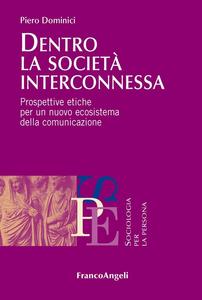Dentro la società interconnessa. Prospettive etiche per un nuovo ecosistema della comunicazione
Par : Piero Dominici
Release date: Jan 2014
FrancoAngeli
Nombre de pages: 164
ISBN: 9788891709103


What are the requirements of the “new” hypercomplexity (cognitive, subjective, organizational, social and ethical) that characterizes the Hypercomplex Society (2008)? Aside from a systemic transnational perspective on strategies and politics, above all what is urgently called for is the definition and configuration of an interpretive theoretical model capable of, if not (fully) comprehending, at least recognizing and explaining the trajectories, which are themselves uncertain and confusing, as well as the numerous discontinuities in a global process of change that, in turn, has been casting radical doubts on paradigms, methodologies, analytic instruments and culture (organizational and non). The cognitive technological civilization has at last begun, after much delay, to realize the importance of a thinking style and a politics that can no longer afford to have a close-minded and particularistic outlook, especially in an era where signs of insecurity, uncertainty and vulnerability of every kind are on display, an era where dramatic conflicts are taking place, that fuel the illusion, not only among the political classes and leaders of the nation states, of the prospect of finding simple and immediate solutions to complex problems, but also – and above all - that reinforce the rationales of exclusion and of perpetual emergency. All of this without considering, on the other hand, the new asymmetries and inequalities that are paradoxically becoming more and more blatant, right here in the era of maximum technological expansion and of extraordinary scientific discoveries.
A hypertechnological era, ever more subject to entropic and chaotic driving forces that, beyond the undeniable accelerations and advances in every field of human and social praxis, should have defined and determined ideal conditions in terms of control and predictability of behavior, processes and systems. A phase of radical global mutation which, as has already been underlined, forces us to reformulate our thoughts on categories, codes, languages, instruments, identity, subjectivity, cultural norms and models, (open) communities, relational and communicative areas, environment and ecosystems. Never before has technological innovation, with all the risks/opportunities that it implies, brought the social actors and organizations to the brink of making a further, irreversible quantum leap.
This step-by-step attainment of evolutionary self-leverage casts radical doubts on traditional models and categories, obliging (?) us to revise the very concept of “Person,” rethinking humanity and its somehow ambiguous interaction with all that is technical and technological: an interaction that must give rise to a complex synthesis, whose perspectives, developments and implications cannot yet be evaluated. Caught between utopia and dystopia. Between the forces of interdependence and fragmentation. Between inclusion and exclusion, within asymmetries running along discontinuous trajectories.
We find ourselves within the interconnected/hyperconnected society that “is a hypercomplex society” , in which the management and processing of information and knowledge have by now become our main resources, a kind of society where the exponential growth of opportunities for connection and information transmission - the fundamental factors of economic and social development - do not yet correspond to an analogous increase in the opportunity for communication, which we define as the social process of knowledge-sharing that entails equality and reciprocity (inclusion). Technology, the social networks and, more in general, the digital revolution, despite having determined a paradigm shift in the setting up of the structural conditions, allowing the interdependency (and the efficiency) of systems and organizations, and having intensified the intangible flow between social actors, have not yet been able to guarantee that the interactive networks that have been created will generate genuine communicative relationships, based on, that is, truly shared, symmetrical rapports. In other words, the network has constructed a new ecosystem of communication (1996) but, although it has designated a knowledge zone, it cannot by itself assure horizontality or symmetrical relationships. Again, the difference comes down to who and how: the people and the uses that they make of technology, beyond the potential interests at stake. For the same reasons, we will henceforth be using the term “connection technology” instead of “communication technology.”
L'attuale ecosistema della comunicazione, fondato su un'economia della condivisione e dell'immateriale, ci porta a riflettere criticamente e valutare le straordinarie potenzialità, ma anche le numerose criticità, della moderna prassi comunicativa e tecnologica: un cambiamento radicale di codici, culture, modalità di produzione e condivisione, gerarchie (disintermediazione) - una vera trasformazione antropologica (1996) - dalle numerose implicazioni in termini di paradigma, di cittadinanza e inclusione (non solo digitale), con ricadute notevoli su identità e soggettività in gioco. Una rivoluzione di tale portata, legata a molteplici variabili e concause, da occasione irripetibile di innovazione sociale e mutamento, potrebbe rivelarsi l'ennesima opportunità per élites e gruppi sociali ristretti, a causa di tanti fattori: digital divide, cultural divide (troppo a lungo sottovalutato), asimmetrie, mancanza di strategie sistemiche di lungo periodo. Per questa complessità sociale, oltre ad una rinnovata attenzione per le regole e i diritti (Net Neutrality, FOIA, Internet Bill of Rights), occorrono approccio alla complessità, in grado di evitare spiegazioni riduzionistiche e deterministiche, ma anche, e soprattutto, una nuova sensibilità etica.
Dal momento che, oggi, come mai in passato, la tecnologia è entrata a far parte della sintesi di nuovi valori e di nuovi criteri di giudizio (1998). Gli attori sociali si trovano di fronte alla possibilità di operare un irreversibile salto di qualità: ma il problema non è soltanto rilevare, osservare il fatto scientifico, quanto prendere atto che la comunicazione è soprattutto un comportamento che genera comportamenti e produce valore. E, nel far questo, è di fondamentale importanza non confondere i mezzi con i fini, il piano degli strumenti con quello dei contenuti, la comunicazione con la connessione.











